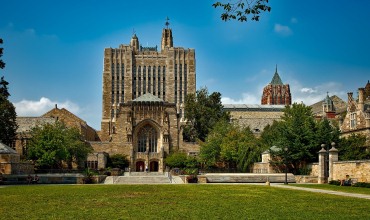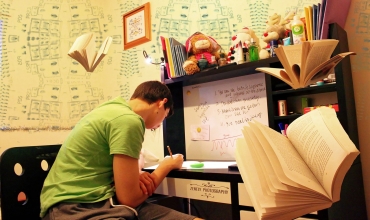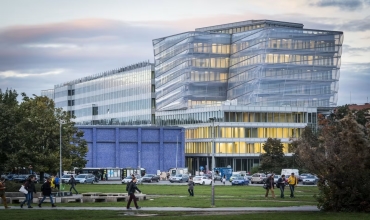The Volyn oblast is located in the north-western part of Ukraine within
the geographical area called the Ukrainian Polissia. The oblast borders
to Poland in the west, Belarus to the north, Rivne and Lviv oblasts of
Ukraine to the east and south.
The area of the oblast is 20,200 square kilometres (3,3% of total
Ukraine’s territory) and stretches for 187 kilometres from north to
south and for 163 kilometres from east to west.
The population of oblast comprises 1,054,700 people (2.2% of total
population of Ukraine). More than a half – 50.3 per cent are urban
dwellers and 49.7 per cent reside in the countryside. The average
population density is 52.5 persons per a square kilometre.
HISTORY
Volyn is an ancient Rus historic region in the basin of the picturesque
southern tributaries of the Prypiat River and the upper reaches of the
Western (Zakhidny) Bug River. According to one of the hypotheses, this
land was named after an Eastern Slavic tribe that lived near this river
and founded the town of Velyn.
In 981 Prince Volodymyr Svyatoslavovych made the Volyn region a part of
the Kyiv state, and in 988 he let Vsevolod, his son, rule it. It was
under his rule that the town of Volodymyr was created which became the
capital of the Galytsko-Volynske princedom in the 12th century, after
the Kyivska Rus collapse.
In the middle of the 14th century, the Volyn region got under the
dominion of the feudal Lithuania. By the Lublin Union of 1569, Poland
and the Grand Lithuanian princedom were united into one state – Rich
Pospolyta that comprised the Volyn region. The tsar’s edict of 1797
created the Volyn province instead of the Volyn region ruled by the
governor-general.
According to Riga Treaty of 1921 the western parts of the Volyn region
passed to Poland. During the 20th century the historic Volyn lands had
been under the dominion of Austria and Hungary, Poland and Germany until
they were finally divided between four oblasts of Ukraine.
Early in December 1939, the Volyn region became a part of the Ukrainian
Soviet Socialist Republic, and since August 1991 it has been an integral
part of the independent state Ukraine.
ECONOMIC STRUCTURE
The leading branch of the regional economy is an agro-industrial sector
which ensures nearly half of the oblast gross product. Local agriculture
specializes in meat and dairy cattle breeding; crops, sugar beets,
vegetables and potato growing. New economic relations based on private
ownership for land and properties have been introduced in agriculture.
Almost 100 per cent of agricultural output is ensured by private sector.
167 enterprises are working in an industrial sector. The leading are
food, machine building, fuel, chemical and building materials
industries. The largest share in the total oblast industrial output
belongs to food industry – 58.9 per cent. Local enterprises produce
control devices, bearings, machinery for cattle breeding and fodder
making, plastics, fabrics, linoleum, soft roofing materials, building
bricks, furniture, confectionery, pasta, canned foodstuffs, sausages,
alcohol, etc.
There are 3,700 small private enterprises and 28,300 entrepreneurs in
the oblast where nearly 10 per cent oblast able-bodied citizens are
employed. Small enterprises ensure 9.2 per cent of the oblast gross
product and 20 per cent of all budget revenues.
The economic structure of the region is as follows (in per cent to gross
product):
Agriculture – 35.3;
Services – 26.2;
Industry – 25.1;
Construction – 3.6.
Coal, natural gas, phosphates, copper, building stone, building chalk,
saprobe and helium constitute mineral and natural potential of the
oblast. In addition, there are also deposits of peat, brick-and-tile raw
materials, sand and cement raw materials.
EDUCATIONAL AND CULTURAL STRUCTURE
The oblast network of academic and research institutions incorporates 14
institutions of higher education; 30 vocational schools; 824 secondary
schools; 5 specialized sector-oriented design, research and development,
and methodological institutes; 4 sector-oriented design organizations;
and a regional scientific and production centre of environmental and
airspace monitoring “Polissia”. Besides, the Polissia branch of the Soil
Science and Agrochemistry Institute, scientific and production
associations “Grasses” (Travy) and “Elite”, a scientific and production
selection centre on beef cattle breeding “Zorya”, and an engineering and
survey station of agricultural chemistry are supporting the
agro-industrial sector.
The oblast network of academic and research institutions incorporates 14
institutions of higher education; 30 vocational schools; 824 secondary
schools; 5 specialized sector-oriented design, research and development,
and methodological institutes; 4 sector-oriented design organizations;
and a regional scientific and production centre of environmental and
airspace monitoring “Polissia”. Besides, the Polissia branch of the Soil
Science and Agrochemistry Institute, scientific and production
associations “Grasses” (Travy) and “Elite”, a scientific and production
selection centre on beef cattle breeding “Zorya”, and an engineering and
survey station of agricultural chemistry are supporting the
agro-industrial sector.
The cultural area of the region comprises 2 theatres, 664 houses of
culture, 579 libraries and 7 museums.
One can learn about great historical and cultural heritage of Volyn when
attending “Cossaks’ tombs” museum telling about cossaks’ feat and
heroism in the combat near the town of Berestechko in 1651 under Bohdan
Khmelnitsky’s leadership.
In town of Ustylug which is situated very close to the Ukrainian-Polish
border there is an “Old Grange” museum, former estate of Igor
Stravinsky, the place where the famous composer created several music
works – “The Fire Bird”, “The Rite of Spring” and others.
The exposition of an out-door museum in Rokyni village will tell its
visitors about history of agriculture and wooden architecture in the
Volyn oblast.
The Volyn Local Lore Museum welcomes its guests in the world of history
and culture. Here they can learn folk handicrafts, local customs and
rites, and Christianity monuments. The Museum of Volyn Icon opened in
1993 contains a huge collection of religious art works including the
unique Icon of Chelm Blessed Virgin which is considered to be one of
oldest icons in Ukraine.
There are over 150 architectural monuments in the oblast. Every year the
region holds art and music festivals, like “Christmas Mystery”,
“Polissia Summer with Folklore”, “Oberih”, “Waves of the Svityaz”,
various exhibitions and fairs of handicraft works.
ENVIRONMENTAL CONSERVATION
The total area of forests in the oblast is 690,000 square hectares, ie
31.7 per cent of its total area. Hunting areas cover 1,500 hectares.
Local forests are rich in mushrooms, berries, medicinal herbs, birds and
animals, and can satisfy various demands for recreation, treatment,
health improvement, and general education.
The total area of forests in the oblast is 690,000 square hectares, ie
31.7 per cent of its total area. Hunting areas cover 1,500 hectares.
Local forests are rich in mushrooms, berries, medicinal herbs, birds and
animals, and can satisfy various demands for recreation, treatment,
health improvement, and general education.
The natural water stock is constituted by 220 lakes with total area of
14,300 hectares and 130 rivers with overall length exceeding 3,200
kilometres.
There are three water-bog territories of international significance in
Volyn: Shatsk lakes (32,800 hectares), the Prypiat river (12,000
hectares) and the Stokhid river (10,000 hectares) basins.
Close to the borders with Poland and Belarus there is Shatsk National
Natural Park, the place that is unique not only in Ukraine but also in
Central and Eastern Europe. One of the largest and most beautiful lakes
of Ukraine – the Svitaz – is situated on the territory of the park.
The Regional ecological programme “Ecology – 2010” has been developed
and approved in the oblast. Its priority fields and primary nature
protecting activities include:
reconstruction and construction of sewerage and sewage;
the building of modern sites for solid domestic wastes storage;
implementation of soil protecting activities in agriculture;
development and realization of a programme for efficient mineral and raw
materials base use;
rational use and protection of natural resources;
expansion of natural reserved areas.
The oblast has considerable recreational resources: moderate continental
climate, varying landscapes, forests, dense network of rivers and lakes,
resources for therapeutic mud baths, mineral springs, and phytocuring
reserves, which favour tourism and recreation all the year round.
MACROECONOMIC STATISTICS
Major results of social and economic activities in the Volyn oblast
Industrial output (goods, works, services) – 270.7 mln. USD
Volumes of consumer goods production – 169.9 mln. USD
New kinds of products introduced – 573 articles
Volumes of agricultural products – 435.6 mln. USD
Volumes of construction works – 23.2 mln. USD
Turnover of goods – 72.8mln. tons/km
Passenger turnover – 480mln. passengers
Goods export – 147.9 mln. USD
Goods import – 324.7 mln. USD.
INTERNATIONAL RELATIONS
Foreign trade turnover in 2002 amounted to 472.6 mln. USD. The major
products exported were fuel, oil and oil products, machinery, casein and
animal husbandry products. Fuel materials, plastics, rubber, vehicles,
tools and devices, electro technical equipment prevailed in import
deliveries. Business contacts were maintained with 82 countries. The
largest trade partner of the oblast is Russia, the share of which
exceeds 50 per cent in the total foreign trade turnover of Volyn. More
than 20% of foreign transactions were implemented with the EU countries.
Economic relations with CEEC and Baltic states were developing very
dynamically too, especially with Poland, Lithuania, Slovakia, Romania
and Hungary.
Over 65,000,000 USD were invested into the region’s economy from 23
countries. Co-operation with international organizations and
institutions gave a positive impetus on social and economic development
of the oblast. For instance, the European Commission funded construction
of the second bridge via the Western Bug River in the area of the
international automobile passage “Yahodyn/Dorohusk” in the framework of
CBC Tacis.
In fields of administrative and economic reforming Volyn was selected
among other Ukrainian regions to participate in Tacis “Promotion of
regional development” and “Improvement of environment for small and
middle business development” projects.
In an environmental field the EC awarded a grant for implementation of
the activities within the CBC SPF Tacis project “The promotion of
sustainable development and regional environmental protection policies
in the context of cross-border co-operation between the Ukraine and
Poland”.
Border co-operation with neighbouring areas in Poland and Belarus takes
especially significant place in international relations of the Volyn
oblast. It was greatly favoured by setting up in 1995 a cross-border
association “Euroregion BUG” which incorporates the Volyn oblast in
Ukraine, the Brest region in Belarus and the Lublin voivodship in
Poland. Its activities contributed to creation of adequate border
infrastructure, strengthening economic collaboration, environment
protection, establishment of close ties between local self-government
authorities, etc. A programme of common actions within this cross-border
association is aimed also to ensure free and lasting co-operation
between NGOs, chambers of commerce, and businessmen.
The Euroregion BUG closely and efficiently cooperates with similar
border regions throughout Europe. Since May 1996 the Euroregion BUG is a
full member of the Association of the European Border Regions.
Great work is being done in the oblast in order to establish economic,
commercial and humanitarian ties with foreign countries on
inter-regional level. At present there are more than 10 regions in the
CIS, Baltic States, Eastern Europe and Latin America with which Volyn
cooperates in fields of trade, economy, healthcare, ecology, science and
education, sports and tourism, and culture.
Нашли опечатку? Выделите и нажмите CTRL+Enter




